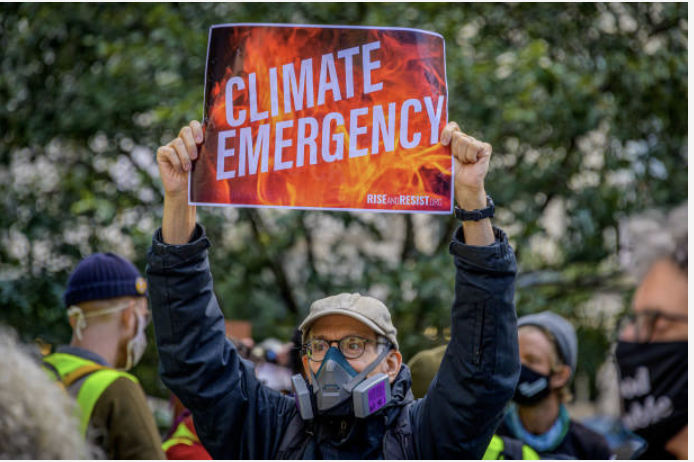If the goal was to ensure a ghastly future then we are currently on track. It need not be inevitable. What is perhaps tragic is that many truly do not grasp the full extent of the impact of climate change and biodiversity loss that is ongoing.
To highlight what is happening a team of 17 subject matter experts have published a very comprehensive report within Frontiers in Conservation Science titled “Underestimating the Challenges of Avoiding a Ghastly Future“. Yes, the word “Ghastly” is not me, that is the term they have opted to use.
Let’s take a closer look.
Underestimating the Challenges of Avoiding a Ghastly Future
Published yesterday, Jan 13, 2020, the report is rests upon a solid scientific foundation. It references 150 studies detailing the world’s major environmental challenges.
It highlights these big issues …
- A loss of biodiversity
- Accelerating climate change
- Population growth
… and lays out what is coming.
Basically it is this. If ignorance and inaction prevail then we face a very real threat to the survival of all species, including our very own.
What they have done is to outline clearly and unambiguously the likely future trends in biodiversity decline, mass extinction, climate disruption, planetary toxification, all tied to human consumption and population growth to demonstrate the near certainty that these problems will worsen over the coming decades.
Political impotence will have an impact that will last centuries.
Observations by the report authors
“Humanity is causing a rapid loss of biodiversity and, with it, Earth’s ability to support complex life. But the mainstream is having difficulty grasping the magnitude of this loss, despite the steady erosion of the fabric of human civilization” Professor Bradshaw says.
“In fact, the scale of the threats to the biosphere and all its lifeforms is so great that it is difficult to grasp for even well-informed experts.
“The problem is compounded by ignorance and short-term self-interest, with the pursuit of wealth and political interests stymying the action that is crucial for survival” he says.
Lead author Professor Corey Bradshaw of Flinders University
“Stopping biodiversity loss is nowhere close to the top of any country’s priorities, trailing far behind other concerns such as employment, healthcare, economic growth, or currency stability.
“While it is positive news that President-elect Biden intends to reengage the US in Paris Climate accord within his first 100 days of office, it is a minuscule gesture given the scale of the challenge.“Humanity is running an ecological Ponzi scheme in which society robs nature and future generations to pay for short-term economic enhancement today”.
Co-Author Professor Paul Ehrlich of Stanford University
“Most economies operate on the basis that counteraction now is too costly to be politically palatable. Combined with disinformation campaigns to protect short-term profits it is doubtful that the scale of changes we need will be made in time” Professor Ehrlich says.
“What we are saying might not be popular, and indeed is frightening. But we need to be candid, accurate, and honest if humanity is to understand the enormity of the challenges we face in creating a sustainable future.
“Without political will backed by tangible action that scales to the enormity of the problems facing us, the added stresses to human health, wealth, and well-being will perversely diminish our political capacity to mitigate the erosion of the Earth’s life-support system upon which we all depend.
“Human population growth and consumption continues to escalate, and we’re still more focused on expanding human enterprise than we are on devising and implementing solutions to critical issues such as biodiversity loss. By the time we fully comprehend the impact of ecological deterioration, it will be too late.
“Without fully appreciating and broadcasting the scale of the problems and the enormity of the solutions required, society will fail to achieve even modest sustainability goals, and catastrophe will surely follow” Professor Blumstein concludes.
Co-author Professor Dan Blumstein from UCLA
What are they so alarmed?
Below is a graphic from the report that illustrates the problem. What you are looking at are the major environmental-change categories that we face.
Red indicates the percentage of the category that is damaged, lost, or otherwise affected, whereas blue indicates the percentage that is intact, remaining, or otherwise unaffected.
Key Points
We are causing a rapid loss of biodiversity and, with it, Earth’s ability to support complex life.
What is currently missing is recognition of the magnitude of the challenge we now face. we are already on the path of a sixth major extinction.
Stopping biodiversity loss is nowhere close to the top of any country’s priorities, trailing far behind other concerns such as employment, healthcare, economic growth, or currency stability.
The Paris Agreement set the 1.5–2°C target unanimously in 2016. Since then, progress to propose, let alone follow, (voluntary) “intended national determined contributions” for post-2020 climate action have been utterly inadequate.
They fear that a rising tide of refugees will reduce, not increase, international cooperation in ways that will further weaken our capacity to mitigate the crisis. They estimate 25 million to 1 billion environmental migrants by 2050.
Their goal is not to present a fatalist perspective. There are many examples of successful interventions to prevent extinctions, restore ecosystems, and encourage more sustainable economic activity at both local and regional scales. The concept here is to present a realistic appreciation of the colossal challenges facing the international community and by doing so it might allow it to chart a course to a less-ravaged future.
